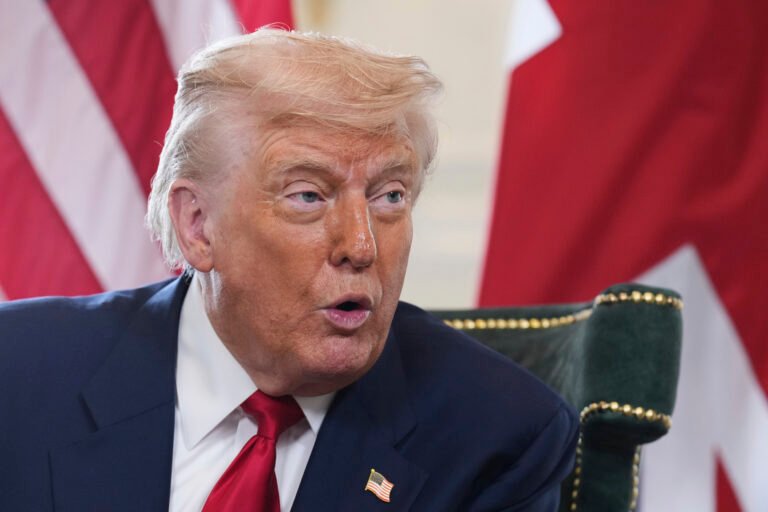
In today’s issue:
▪ Powell resists Trump rate pressure
▪ Stock trading ban advances in Senate
▪ Redistricting takes center stage ahead of 2026
▪ Witkoff heads to Israel for Gaza aid, peace talks
President Trump remained bullish about the country’s economic prospects on Wednesday, even as the Federal Reserve declined to cut interest rates and his tariff deadline looms.
While the country’s economic outlook will come into clearer focus with today’s inflation numbers and tomorrow’s jobs report, experts agree Trump’s tariffs are skewing the picture and adding uncertainty, even if markets are mostly starting to shrug.
FED IMPACT: Trump on Wednesday touted the new gross domestic product (GDP) numbers on Truth Social, calling the 3 percent growth “WAY BETTER THAN EXPECTED!”
The president again urged Fed Chair Jerome Powell, who he criticized with the nickname “Too Late,” to lower interest rates. Powell has pointed to uncertainty surrounding tariffs for why the Fed is keeping rates steady.
“No Inflation! Let people buy, and refinance, their homes!” Trump wrote.
Powell did not buckle under Trump’s pressure campaign, instead keeping short-term interest rates at a level of 4.25 percent to 4.5 percent. But, in a lack of consensus not seen in 30 years, two of the central bank’s governors dissented from the decision. Both are in the running for the job of Fed chair, which will open up at the end of Powell’s term next May.
Powell downplayed the significance of the dissents during a Wednesday press conference, praising Fed Vice Chair of Supervision Michelle Bowman and board member Christopher Waller, both Trump appointees, for laying out clear cases for their decisions.
“This was quite a good meeting all around the table,” Powell said. “People thought carefully about this and put their positions out there. The majority of the committee was of the view that inflation is a bit above target. Maximum employment is at target. That calls for modestly restrictive [interest rates] in my way of thinking.”
▪The New York Times: A history of dissents in the Federal Reserve.
▪The Hill: This is how Trump’s tariffs could affect your grocery bill.
LOOKING UP: Tariffs and uncertainty upended business plans and changed consumers’ spending decisions early this year, leading economic growth to soften. But adjusted for inflation, GDP increased at a 3 percent annual rate in the second quarter, the Commerce Department said, topping forecasters’ expectations.
Economists warn the latest figures may be painting a more upbeat picture of the economy than warranted.
“It’s hard to know exactly what’s happening because the whole trade war is leaving a real imprint on macroeconomic data,” Blerina Uruci, chief U.S. economist at T. Rowe Price, told The New York Times. “But the picture isn’t as rosy as a 2 or 3 percent growth rate would indicate.”
The International Monetary Fund (IMF) on Tuesday upgraded the economic outlook for the U.S. and the world this year and next because Trump’s trade policies so far have proven less damaging than expected. The IMF forecasts 3 percent growth for the global economy this year, down from 3.3 percent in 2024 but an improvement on the 2.8 percent it had forecast for 2025 back in April.
Companies “frontloading” imports before Trump’s tariffs went into effect, along with the slight tumble of the U.S. dollar, have assisted in the growth of the world economy, IMF’s chief economist Pierre-Olivier Gourinchas told the Financial Times.
BRACING FOR TARIFFS: Trump’s global “reciprocal” tariffs are set to take effect Friday, leaving countries scrambling to wrap up trade deals with the U.S. ahead of the deadline. Trump said Wednesday that he would not extend his self-imposed Aug. 1 deadline and announced a 25 percent tariff on imports from India, seemingly dashing hopes for an agreement with one of the U.S.’s largest trading partners in the next few days.
Meanwhile, the president announced a trade deal with South Korea, matching the structure of deals with the European Union and U.K. In a Truth Social post, Trump said South Korean imports would face a 15 percent tariff, while U.S. exports to the country would not be tariffed. The U.S. also reached trade agreements with Thailand and Cambodia, according to Commerce Secretary Howard Lutnick.
“The August first deadline is the August first deadline — It stands strong, and will not be extended,” Trump posted. “A big day for America!!!”
▪ The Hill: Consumer products giant Procter & Gamble said it would raise prices on many products in part due to higher costs from Trump’s tariffs.
▪The Wall Street Journal: Ford Motor paid out more than $800 million in tariffs last quarter, despite manufacturing most of its vehicles in the U.S.
▪The Hill: Trump is ending an exemption that allowed certain low-value commercial shipments into the United States without facing tariffs.
Smart Take with Blake Burman
It’s back. The conversation around a potential congressional stock trading ban reignited Wednesday. A Senate committee advanced a measure, which President Trump later warned was a trap set by Democrats.
When first asked about the measure, the president said he needed to see the details, but he also called for an investigation into Rep. Nancy Pelosi (D-Calif.). I spoke with Rep. Seth Magaziner (D-R.I.), who has bipartisan legislation addressing this issue.
“None of us are going to call out specifically other individual members, because we understand that if we’re going to get this done and ban stock trading, this has to be a bipartisan effort,” Magaziner said.
History shows this has an uphill climb to get across the finish line. By the way, the online prediction markets currently have the probability of a ban occurring this year at right around 14 percent.
Burman hosts “The Hill” weeknights, 6p/5c on NewsNation.
3 Things to Know Today
- Obama-era intelligence officials John Brennan and James Clapper wrote a New York Times op-ed pushing back on Trump officials’ “patently false” claims about Obama administration actions surrounding Russia’s efforts to influence the 2016 election.
- The Pentagon has pulled back more than 1,000 National Guard troops who were deployed to Los Angeles in June amid protests over Trump’s immigration crackdown. About 250 Guard soldiers will remain after the latest scaleback.
- Investigators probing the January collision between an Army helicopter and passenger plane at Ronald Reagan Washington National Airport in D.C. found the chopper was flying higher than it should have been and its altitude readings were inaccurate.
Leading the Day
STOCK TRADING: The president on Wednesday lashed out at Sen. Josh Hawley (R-Mo.) and members of Congress who are advancing efforts to ban stock trades by lawmakers, presidents and vice presidents, even though the latest iteration won’t apply to Trump’s current investments.
“The Democrats, because of our tremendous ACHIEVEMENTS and SUCCESS, have been trying to ‘Target’ me for a long period of time, and they’re using Josh Hawley, who I got elected TWICE, as a pawn to help them,” Trump wrote in a scathing Truth Social post. “I wonder why Hawley would pass a Bill that Nancy Pelosi is in absolute love with — He is playing right into the dirty hands of the Democrats.”
Trump used the message to send a warning to others in the GOP who may get on board: “I don’t think real Republicans want to see their President, who has had unprecedented success, TARGETED, because of the ‘whims’ of a second-tier Senator named Josh Hawley!”
Earlier in the day Trump had said he liked the ban “conceptually” before launching into an attack on former Speaker Nancy Pelosi (D-Calif.) over unfounded claims of insider trading.
A Senate committee advanced the stock trading ban on Wednesday, despite opposition from all Republicans on the panel but Hawley. A key component of the proposal requiring divestments would only take effect at the start of a new elected term — essentially exempting Trump.
The proposed legislation, which has been mulled for years, would prohibit members of Congress, the president and vice president from buying stocks, and would ban them from selling stocks for 90 days after enactment.
“We have an opportunity here today to do something that the public has wanted to do for decades,” Hawley said during a hearing on the bill. “And that is to ban members of Congress from profiting on information that frankly only members of Congress have on the buying and selling of stock.”
Pelosi said Wednesday that, while she has been cited by Republicans as a target of the ban, she’s on board with the latest effort. She also blasted Trump over his objections to the bill.
“Not that I think anybody’s doing anything wrong — if they are, they are prosecuted and they go to jail — but because of the confidence it instills in the American people,” she told CNN’s Jake Tapper. “The president has his own exposure, so he’s projecting. He’s always projecting.”
Meanwhile, Rep. Anna Paulina Luna (R-Fla.), who has been a staunch Trump ally, is vowing to file a discharge petition to try to force a vote on the stock trading ban in the House.
“Even if no laws are broken, the appearance of profiting from this access fuels distrust among Americans,” Luna said. “The American people do not trust the US government, and this is a step forward to building that trust.”
GRASSLEY: Republican senators were appalled by the personal attack the president lobbed at 91-year-old Sen. Chuck Grassley (R-Iowa) this week over a long-standing procedure known as the Senate “blue slip.”
Trump suggested on Truth Social on Tuesday that Grassley, who chairs the powerful Judiciary Committee, could single-handedly “solve the ‘Blue Slip’ problem” that has held up the president’s judicial appointees in some blue states.
“Chuck, I know you have the Courage to do this, DO IT!” Trump wrote in the lengthy post, claiming credit for Grassley’s two most recent successful reelection bids.
The president also pointed out Grassley’s age and tenure in the Senate, reposting a list calling for term limits. Grassley, the longest-serving member in the upper chamber, has been in the Senate for more than four decades.
“I think it was a bad — No. 1, Chuck is beloved in our conference. No. 2, the blue-slip policy helps the president. He’s got staff giving him bad advice,” Sen. Thom Tillis (R-N.C.) said.
NAVIGATING ISRAEL: Israel’s ongoing war against Hamas in Gaza is testing the long-standing Republican regard for the U.S.’s close ally and creating new headaches for GOP leaders.
The Hill’s Mike Lillis reports that while a vast majority of congressional Republicans still support Israel’s war effort, the party’s united front has cracked in recent weeks as members of a small but vocal isolationist wing have pushed to slash U.S. military aid.
▪ The Hill: Rep. Mike Flood (R-Neb.), the new Main Street Caucus chair, is gearing up for a funding showdown.
EPSTEIN QUESTIONS: Democrats are ramping up pressure on Republicans over the Jeffrey Epstein files, turning to an arcane rule to attempt to force the release of documents and highlight an issue that has become a sore subject for the Trump administration and Republicans.
Senate Minority Leader Chuck Schumer (D-N.Y.) is leading the charge to force the release by using the “rule of five,” a relic of a 1928 law that requires government agencies to hand over information if any five lawmakers on a Senate or House panel — in this case the Senate Homeland Security and Governmental Affairs Committee — request them.
“This is not complicated,” Schumer said at a press conference Wednesday. “Every single time Trump, his administration [and] Republican leaders have had a chance to be transparent about the Epstein files, they’ve chosen to hide.”
ADMINISTRATION ROUNDUP:
▪ The Hill: Trump’s battle with The Wall Street Journal and Rupert Murdoch is being closely watched as a test of the power dynamic between two of the most influential figures on the right over the last several decades.
▪ CBS News: Brown University cut a deal with the White House to restore research grant funding in exchange for commitments on women’s sports, antisemitism and admissions practices.
▪The Hill: Trump is considering whether to allow retirement funds to invest in private equity firms, a financial sector that’s hungry for capital after contracting last year for the first time in decades.
Where and When
- The president will have lunch with Vice President Vance at 12:30 p.m. At 4 p.m., he will sign an executive order.
- The White House press briefing is scheduled for 1 p.m.
- The Senate will convene at 10 a.m.
- The House is in recess and resumes work in Washington on Sept. 2.
Zoom In
TEXAS HOLD ’EM: Texas Republicans unveiled their proposal for new congressional maps Wednesday as the national redistricting battle heats up.
The maps would create five new House seats that Trump won by double digits last fall. The president had pressed Texas lawmakers to redraw the lines with the party’s slim 219-212 House majority in mind for the upcoming midterms. Republicans already hold 25 of the state’s 38 congressional seats, but the changes could boost the GOP to 30 seats.
“Just a simple redrawing. We pick up five seats,” Trump said of the idea earlier this month.
The Hill’s Julia Mueller and Saul Elbein have the rundown on the Texas Democrats most at risk under the latest proposal.
Speaker Mike Johnson (R-La.) brushed off discussion of the topic during an interview on CNN Wednesday evening.
“It’s the prerogative of the states, and so, not really my lane,” Johnson said. “I will work with whatever we have at the end of the day. We have a solid, hardworking Republican majority in the House right now, and the Senate. We’re delivering for the people, and I’m very excited to go out and tell that story.
“I’m very excited about the midterm election,” he added.
▪ The Hill: Here are the states to watch in the redistricting arms race.
▪ The New York Times: Texas Republicans unveil gerrymandered House map, trying to please Trump.
STATE LEGISLATURES: The brewing war between blue states and red states over redistricting has highlighted the growing role of state legislatures heading into the midterms.
State legislators from Texas to New York are increasingly taking measures into their own hands as they look to redraw congressional lines that could ultimately decide control of the House for years to come.
Now, both parties are stepping up their efforts to win control of state legislatures across the country, shining a fresh light on races that have long been considered sleepy affairs.
“Local races and state House races, state Senate races have always mattered,” said Republican strategist Jimmy Keady, who’s worked on state legislative races. “They’re just becoming more important in the long run, because now they’re directly influencing representation that is happening in the federal space.”
VOTING RIGHTS: Republicans are angling to chip away at the Voting Rights Act, as Democrats renew a long-shot push to broaden the landmark law that turns 60 next week.
The Supreme Court could become the final arbiter when it re-hears a major Louisiana redistricting case next term or when other significant cases bubbling up in the lower courts reach the justices.
“There are clouds around, and a lot of them are circling the Supreme Court at the moment,” said Adriel Cepeda Derieux, the deputy director of the American Civil Liberties Union’s Voting Rights Project.
The conservative-majority court has already knocked out a significant part of the law, but the new legal fronts could reshape decades-long precedent of legal battles over political power.
CALIFORNIA DREAMIN’: Former Vice President Kamala Harris won’t run for governor in her home state next year.
“I love this state, its people, and its promise. It is my home. But after deep reflection, I’ve decided that I will not run for Governor in this election,” the former Democratic presidential candidate said in a statement Wednesday.
▪ The New York Times: Harris’s decision not to run for governor of California leaves open the door to a presidential campaign in 2028, even as her fellow Democrats are months into preparing for a future without her.
▪ The Hill: Top Biden aide Steve Ricchetti tells GOP panel ex-president was “fully capable.”
NORTH CAROLINA: Former Gov. Roy Cooper’s(D) entry into the North Carolina Senate race could elevate health care as a top campaign issue in a state Democrats view as crucial in their longshot bid to regain control of the chamber.
The Hill’s Nathaniel Weixel explains why Cooper, who expanded Medicaid in the state while governor, is likely to hammer his chief rival, Trump-endorsed Republican National Committee Chair Michael Whatley, over the issue.
Elsewhere
GAZA: White House envoy Steve Witkoff is in Israel to discuss the humanitarian crisis in Gaza. The trip comes amid a stalemate in the Gaza truce and hostage talks and the catastrophic aid crisis in the enclave.
As Israel faces criticism from the international community — including Trump — for the dire conditions in Gaza, the question remains whether Israeli Prime Minister Benjamin Netanyahu will change his policy and put a stop to military operations in Gaza, where the death toll topped 60,000 Tuesday.
“The president wants to know more about what the humanitarian situation in Gaza is in order to know how to get more assistance to civilians in Gaza,” a U.S. official told Axios.
Humanitarian aid organizations and international bodies have warned that Gaza is facing “critical” levels of hunger and that famine is “imminent” in parts of the territory. According to the Hamas-run Gaza Ministry of Health, as of Monday, 14 people died of hunger over a 24-hour period, bringing the total number of deaths from that cause to 147 since the Israel-Hamas war began in 2023. Of those deaths, at least 88 have been children.
Canada will recognize a Palestinian state in September, Canadian Prime Minister Mark Carney said Wednesday. The announcement follows similar moves from countries including the United Kingdom and France. Trump said Thursday that it would be “very hard” to make a trade deal with Ottawa if Canada recognized Palestinian statehood.
▪ The New York Times: The hunger in Gaza presents Trump with a moral test familiar to past presidents. The crisis has echoes of past humanitarian crises that left presidents wringing their hands over how to respond.
▪ Time magazine: The malnutrition crisis in Gaza will outlive the war, experts warn.
▪ Reuters: An Israeli minister hinted at annexing parts of Gaza.
BRAZIL: Trump on Wednesday signed an executive order raising tariffs on imports from Brazil to 50 percent, escalating his fight with the largest South American economy.
The move comes as the Treasury Department on Wednesday sanctioned Brazilian Supreme Federal Court Justice Alexandre de Moraes, who has been a target of criticism by Trump for his handling of legal cases involving former Brazilian President Jair Bolsonaro.
De Moraes revoked Bolsonaro’s passport and issued additional punishments to the leader who allegedly staged a coup with several dozen others following his 2022 electoral loss to President Luiz Inácio Lula da Silva. The Trump administration’s efforts to single out de Moraes signals his still-close ties to Bolsonaro, who has called on Trump to help him regain prominence in the region.
▪ CNN: Russia’s summer offensive is turning into an escalating crisis for Ukraine.
Opinion
- The weirdest GDP report ever, by The Wall Street Journal editorial board.
- Trump’s respect for “national sovereignty” is situational, by The Washington Post editorial board.
The Closer
And finally … ⛳ It’s Thursday, which means it’s time for this week’s Morning Report Quiz! Inspired by Trump’s golfing trip, we’re eager for some smart guesses about presidents and golf.
Be sure to email your responses to kkarisch@thehill.com and ecrisp@thehill.com — please add “Quiz” to your subject line. Winners who submit correct answers will enjoy some richly deserved newsletter fame on Friday.
Which president holds the record for playing the most golf, getting in 1,200 rounds in six years?
1. Barack Obama
2. Calvin Coolidge
3. Woodrow Wilson
4. Richard Nixon
In his first term as president, approximately how many rounds of golf did Trump play?
1. 57
2. 261
3. 302
4. 189
Which president was famous for hitting spectators with golf balls?
1. Ronald Reagan
2. Gerald Ford
3. Richard Nixon
4. Bill Clinton
Of the last 20 presidents, which did not play golf?
1. Jimmy Carter
2. Harry Truman
3. Herbert Hoover
4. All of the above
Check out more newsletters here. See you next time!


